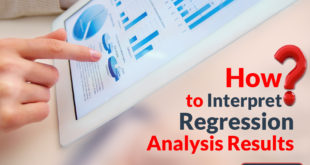Use of covariates in RCTs (wonkish) .[embedded content]
Read More »Bayes vs classical statistical p-testing
Bayes vs classical statistical p-testing .[embedded content] [For more on the RCT referred to in the video, take a look here. Mortality numbers are, of course, important, but so is the fact that among the 241 patients who received the drug, 52 developed severe illness, compared to 43 of 249 patients who did not take the drug … ]
Read More »Vad ‘kontrollera för något’ betyder i regressionsanalys
.[embedded content]
Read More »Dynamic and static interpretations of regression coefficients
Dynamic and static interpretations of regression coefficients When econometric and statistical textbooks present simple (and multiple) regression analysis for cross-sectional data, they often do it with regressions like “regress test score (y) on study hours (x)” and get the result y = constant + slope coefficient*x + error term. When speaking of increases or decreases in x in these interpretations, we have to remember that it is a question of...
Read More »Misunderstanding randomization
While raising worthwhile points, most discussions I see misunderstand randomization in both causal and statistical ways. Notably, randomization can be valuable but does not induce balance in the ordinary English sense of the word, nor does it deal with most problems of real experiments. Furthermore, the use of the word “balance” to describe what randomization actually does invites confusion with the ordinary English meaning of “balance” (as does use of ordinary words like...
Read More »Do RCTs really control for ‘lack of balance’?
Do RCTs really control for ‘lack of balance’? Mike Clarke, the Director of the Cochrane Centre in the UK, for example, states on the Centre’s Web site: ‘In a randomized trial, the only difference between the two groups being compared is that of most interest: the intervention under investigation’. This seems clearly to constitute a categorical assertion that by randomizing, all other factors — both known and unknown — are equalized between the experimental...
Read More »How to compute causal effects using regression (student stuff)
How to compute causal effects using regression (student stuff) .[embedded content]
Read More »A beginner’s guide to Bayesian statistics (student stuff)
A beginner’s guide to Bayesian statistics (student stuff) .[embedded content]
Read More »Debating the value of randomization
Debating the value of randomization In Social Science and Medicine (December 2017), Angus Deaton & Nancy Cartwright argue that RCTs do not have any warranted special status. They are, simply, far from being the ‘gold standard’ they are usually portrayed as: Randomized Controlled Trials (RCTs) are increasingly popular in the social sciences, not only in medicine. We argue that the lay public, and sometimes researchers, put too much trust in RCTs over...
Read More »LATE calculation (student stuff)
LATE calculation (student stuff) .[embedded content] As Scott Cunningham has it in Causal Inference: The Mixtape: How do you know when you have a good instrument? … A necessary but not sufficient condition for having an instrument that can satisfy the exclusion restriction is if people are confused when you tell them about the instrument’s relationship to the outcome.
Read More » Heterodox
Heterodox




